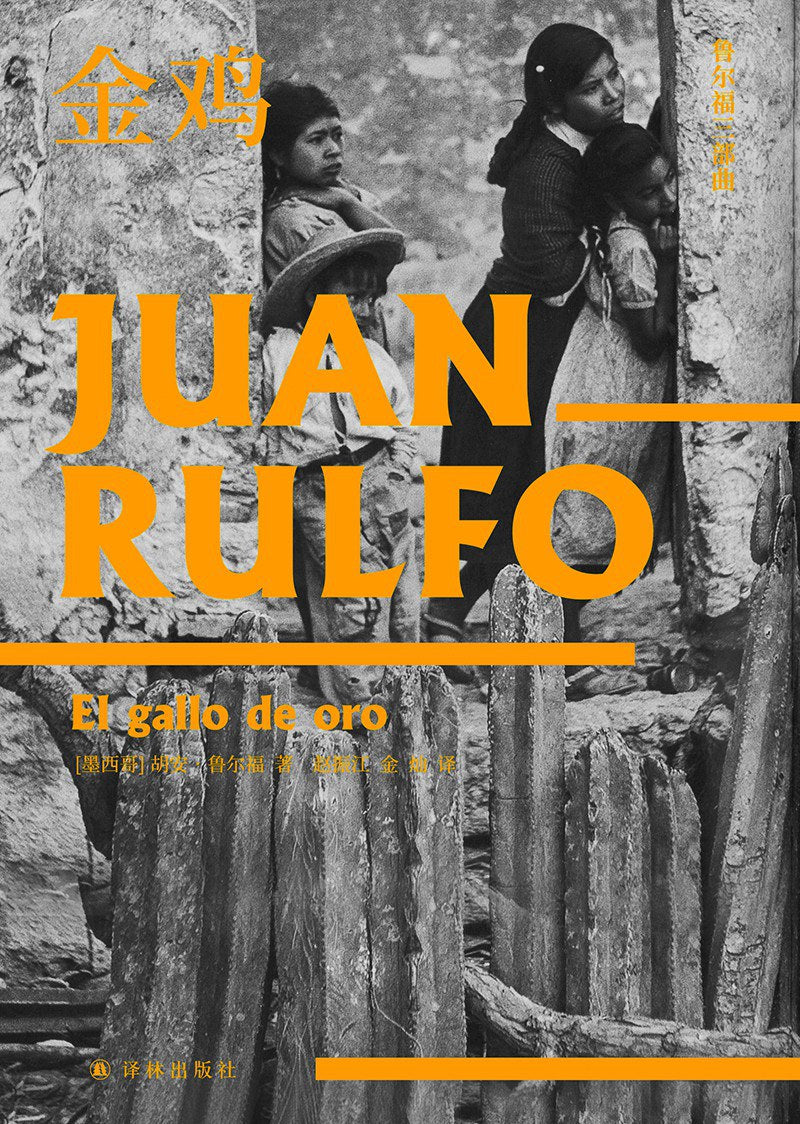WULOLIFE
《金鸡:鲁尔福三部曲》 作者: [墨西哥] 胡安·鲁尔福 译者: 赵振江 / 金灿 出版社:译林出版社
《金鸡:鲁尔福三部曲》 作者: [墨西哥] 胡安·鲁尔福 译者: 赵振江 / 金灿 出版社:译林出版社
Couldn't load pickup availability
Description
内容简介 · · · · · ·
“鲁尔福三部曲”《燃烧的原野》《佩德罗·巴拉莫》《金鸡》
★魔幻现实主义小说流派的开山鼻祖,被誉为“拉丁美洲新小说的先驱”,引领拉美“文学爆炸”的潮流
★ 没有鲁尔福,或许就没有《百年孤独》——
《百年孤独》经典开篇的雏形,灵感来源于《佩德罗·巴拉莫》
从鲁尔福的作品中,加西亚 · 马尔克斯
——
马尔克斯、大江健三郎、勒克莱齐奥……他们都热爱鲁尔福描写原野的笔触;
余华、莫言、苏童……他们都曾受到鲁尔福的深刻影响
★知名翻译家/学者赵振江、屠孟超、张伟劼、金灿从西班牙语直译,附序言导读,收录加西亚·马尔克斯长文序言、作家自述、鲁尔福基金会献词等珍贵内容
★丛书封面独家采用鲁尔福私人摄影,展现作家眼中广袤而迷人的墨西哥大地,藏读两宜
---------------------------------------------
《金鸡》
◎ 中文版首度引进
◎ 十五篇胡安·鲁尔福文学国度的璀璨遗珠,部分首次面世
收录《金鸡》、一封作于1947年写给爱人克拉拉的信、十二个短篇和一首诗作《秘方》及作家自述、鲁尔福基金会献词、《金鸡》文本鉴赏、电影渊源等珍贵内容
◎ 同名电影由加西亚·马尔克斯、富恩特斯联手改编
【内容简介】
迪奥尼西奥·宾松因手臂残疾,只能在村里做着“呼叫者”的体力活营生。一场庙会上,他救下一只奄奄一息悉心照料,母亲却因操劳过度去世。一穷二白决定只身出门闯荡。
金鸡在之后的斗鸡中屡战屡胜,意外地给他带来了生活的勇气。走南闯北中,宾松认识了一位“阉鸡女郎”,有她在的地方,他无往不胜。正当他以为时来运转之时,命运却自有它的安排……
【名人评价】
卡洛斯·维罗委托我将《金鸡》改编成电影,这促使我更深刻地去了解一部个人魅力流露于字里行间。
——加西亚·马尔克斯
都是愚蠢和错误的。或许这样考虑更合适:即胡安·鲁尔福感到作为电影脚本的文学能唤起内心的活力。
——赵振江
胡安·鲁尔福反映的是我们土地上最后的男人和女人。
——卡洛斯·富恩特斯
鲁尔福的文字揭示了“一种并非我们的双眼所看到的景色,而是在我们视力所及的事物后面的景色。一种从来不叙说自身而叙说他物的景色,甚至是更加遥远的景色。这是一种形而上,一种宗教,一种人和宇宙的思想。(……) "
——奥克塔维奥·帕斯
鲁尔福的小说不仅是20世纪文学的杰作,也是20世纪影响最大的书籍之一。
——苏珊·桑塔格
是胡安·鲁尔福第一次真正打开了时间的入口,正是那种神秘的、非理性的、拥有多种时间、跨越生死、打破逻辑的观念,才让他着魔似的将“地的写作推到了一个梦幻般的神性的极致。
——吉狄马加
鲁尔福的小说像墨西哥乡间游荡的,无头无尾,歌词迷离的忧伤歌曲。
——张佳
作者简介 · · · · · ·
胡安·鲁尔福(1917—1986)
一生只留下篇幅极其有限的作品,却被众多作家奉为文学偶像。墨西哥国家文学奖、比利亚乌鲁蒂亚文学奖、西班牙阿斯图里亚斯王子文学奖得主,墨西哥语言学院院士。与奥克塔维奥·帕斯、卡洛斯·富恩特斯并称墨西哥文学20世纪后半叶的“三驾马车”。
1917: ,并于1953年以《燃烧的原野》为题结集出版。
1955年,《佩德罗·巴拉莫》问世。小说不仅立意深刻,在艺术形式上也富有新意,迄今仍被认为是“拉丁美洲文学的巅峰小说之一”,在世界各国广为流传。
1956年,鲁尔福回到首都写作商业电影脚本,此后不久《金鸡》完成。《金鸡》于1964 in 1980 in 1980 in
1986, 1986
目录 · · · · · ·
金鸡秘方生命本身并非那么严肃夜间奇遇致克拉拉的信(十二)
特阿约堡死后我的塞西莉娅姨妈克莱奥蒂尔德我的父亲昨日重现,神父说苏萨娜·福斯特他走在路上,痛苦不堪,累得昏昏欲睡安赫尔·宾松停在路口发现者附录一:《金鸡》故事梗概附录二:《金鸡》文学鉴赏附录三:《金鸡》的电影渊源附录四:关于《秘方》
附录五:关于其他故事
